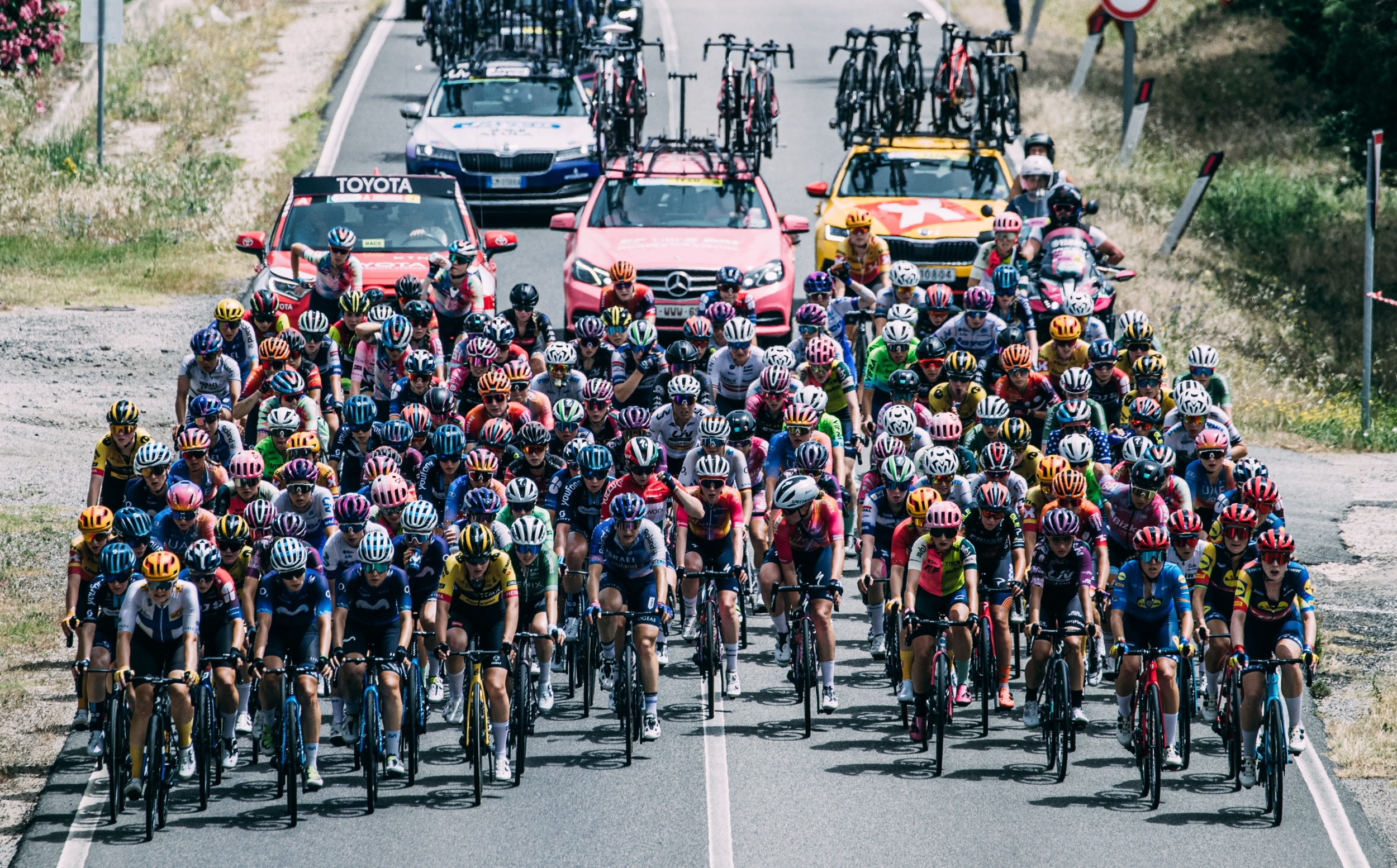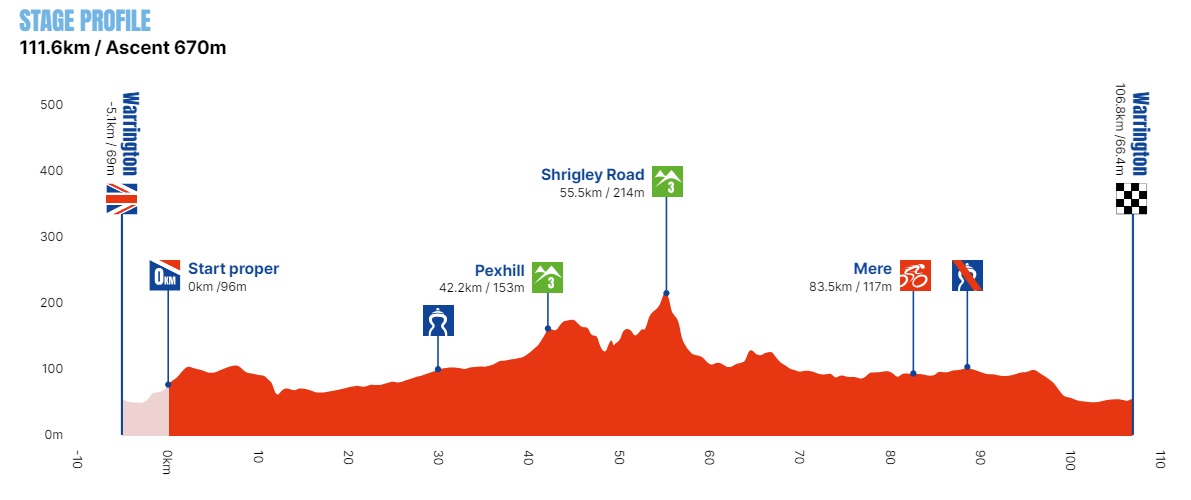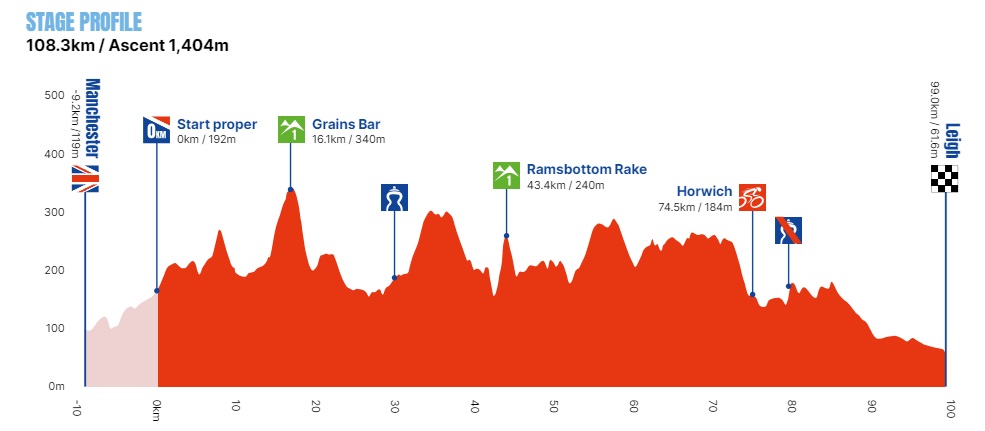

After a one-year hiatus, the Women’s Tour is returning to Great Britain on June 6th as a 4-day stage race with a new name: Lloyds Bank Tour of Britain Women. With stages starting in Welshpool, Wrexham, Warrington, and Manchester, riders will tackle some of the most challenging and hilly terrain in Wales and North West England, with no less than eight categorized climbs for the four stages that will take place from June 6-9.
First held in 2014 as the Women’s Tour, this race quickly became a top event on the Women’s WorldTour calendar, expanding from five to six stages right until the last edition was held in 2022. In 2023, race organizers attempted to organize the event as a 5-day stage race, but financial constraints and a lack of sponsorship forced it to be postponed. Fortunately, the race is now under the management of British Cycling with Lloyds Bank as the long-term title sponsor of the race from 2024 onwards.
Fifteen six-rider teams are scheduled to line up for this year’s edition of Tour of Britain Women. Although there will only be four Women’s WorldTour (WWT) teams participating this year, there will be a number of top-notch Continental (CTW) teams in attendance, as well as a recently added Great Britain Cycling Team composed of top British riders from various WorldTour teams.
Commenting on the addition of a Great Britain Cycling Team, British Cycling Performance Director, Stephen Park CBE had this to say. “We are delighted to be able to confirm such a strong Great Britain Cycling Team for the inaugural Lloyds Bank Tour of Britain Women. We know that the team will relish the rare opportunity to race at home, and for the Paris (Olympic) hopefuls among the squad, the event will play a crucial role in the final preparations for the Games.”
In the past, this race has catered to a wide range of abilities and strengths depending on the design of the route, with riders as diverse as Mariane Vos, Lizzy Deignan, Elisa Longo Borghini, Coryn Labecki, Kasia Niewiadoma, and Demi Vollering all taking overall victories.
Newly appointed race director Rod Ellingworth of British Cycling was enthusiastic about this year’s race and the teams who will be competing. “We are very excited to see such a strong line-up of teams,” Ellingworth said. “In addition to the Women’s WorldTour teams, we are thrilled to welcome an exciting mix of UCI Women’s Continental teams. The race will take in four competitive and challenging routes, some challenging climbing in Wales and what I’m sure will be brilliant crowds on the roadside throughout.”
TEAMS
Great Britain Cycling, SD Worx-Protime (WTW), dsm firmenich PostNL (WTW), Liv AlUla Jayco (WTW), Human Powered Health (WTW), Cofidis (CTW), AG Insurance -Soudal (CTW), VolkerWessels (CTW), St. Michel-Mavic-Auber93 (CTW), Torelli (CTW), Alba Development Road Team (CTW), DAS-Hutchinson-Brother UK (CTW), Doltcini-O’Shea (CTW), Hess Cycling Team (CTW), Lifeplus-Wahoo (CTW), Pro-Noctis-200° Coffee-Hargreaves Contracting (CTW).
THE ROUTE
Stage 1: Welshpool to Llandudno (142.5km)
Starting in Welshpool, stage 1 is one of the most demanding and longest stages of the race with 2178 meters of climbing over 142.5km. The stage will feature two categorized climbs, Llangynog, a category 1 climb (6.1km – 5.3%) at 61.6km, and Ty’n y Llidiart, a category 2 climb (3.3km – 3.4%) at 104.5km. There will also be an Intermediate bonus sprint as well at 122.2km in Dolgarrrog.
The first climb, Llangynog, known locally as the Berwyn Pass, is expected to drop some riders off the back, however, it will more likely be the cumulative effect of the non-categorized climbs that follow over the next 40km that will thin out the peloton.
The last climb, the category 2 Ty’n y Llidiart (104.5km), could be an opportunity for riders to sneak away and grab the bonus sprint in Dolgarrrog (122.2km). However, the quick descent after the climb and the relatively flat 10km that follow will make it challenging to hold off a chase group.
Any group that is together in the final 15km will likely be further reduced on the punchy climbs as they enter the outskirts of Llandudno on their way to the promenade finish line. Expect the top GC rivals to show themselves on this stage, but for the finish to possibly end in a sprint.
The stage will start officially at 12:30 CET, with riders expected to reach the finish at around 16:10 CET

Stage 2: The Wrexham Stage (140.2km)
The second longest day, stage two will start and finish in Wrexham’s city center and will pass through Denbighshire, West Cheshire, and Chester, with one sprint and two categorized climbs coming towards the end of the stage after almost 90km. The first climb, Eyton Hill, is a category 3 (1.4km – 3%) that comes at 89.7km, and on its own won’t prove much of a challenge for the peloton, but with an Intermediate bonus sprint soon after at 93.5km (Johnstown), we may see riders pushing the pace on this climb in a bid to grab the bonus points.
Although riders will have less climbing overall than on stage 1, the final climb of the day, Horseshoe Pass, is a category 1 (4.2km – 6.4%) and could be decisive in allowing a small group to get away. With less than 30km to go after the summit, and mostly descending roads, a group with good descending skills could stay away especially if the peloton has been thinned out on the climb.
The run-in to Wrexham is flat and fast, with the finish right in the heart of Wrexham. Any riders wanting to avoid a sprint will need to attack well before the city limits are reached. Expect the general classification to become much clearer after this stage.
Stage two will start officially at 12:30 CET, with riders expected to finish in Wrexham at approximately 16:15 CET.

Stage 3: The Warrington Stage (106.8km)
The easiest day, stage 3 is for the sprinters and will start and finish in front of the Golden Gates of Warrington Town Hall, traveling in a counter-clockwise direction. After 40km, the peloton will hit two category 3 climbs, Pexhill (2km – 2.7%) which will come at 42.2km, and Shrigley Road (2.9km -2.6%) at 55.5km.
The peloton will ascend a total of 5.66km before they reach the summit of Pexhill to contest the first categorized climb of the day. They will then descend into Prestbury, in sight of the Pennine foothills, and cross the river Bollin up to Pott Shrigley in the foothills of the Peak District to begin the ascent of the second climb, Shrigley Road.
These two short climbs should not cause much difficulty for the peloton, but we will probably see riders attempting to get away on the descent that will follow before the Intermediate bonus sprint in Mere at 83.5km. Two short ramp-ups in Mottram St Andrew at 61km may also provide an opportunity for attacks and breakaways before the bonus sprint.
The last 15km descends for about 5km before it flattens out on its final approach to the city center. The final kilometers will be very fast and teams will have ample time to set up their sprint trains and put their leaders into position. Any riders thinking of getting away in these last 15km will have a very difficult time. This is a day for the GC riders to stay out of trouble and conserve their energy for stage 4.
Stage 3 will start officially at 12:15 CET, with riders expected to finish in Warrington at approximately 16:18 CET.

Stage 4: Manchester to Leigh (99.2km)
The shortest stage of the race will also be one of the most difficult, with 1404 meters of climbing taking place in less than 100km. Starting in Manchester, the home base of British Cycling, this final stage features two category 1 climbs and a lumpy profile that is likely to zap the legs of the peloton and provide an opportunity for riders to escape.
The two climbs take place in the first half of the 99.2km stage, with Grains Bar (2.4km – 5.8%) occurring at 16.1km, and Ramsbottom Rake (1.1km – 10.1%) at 43.4km. Neither climb is particularly long, but the rolling up-and-down nature of the stage will require GC riders to stay alert and attentive to their rivals.
After the short, but steep, Ramsbottom Rake climb is crested, there is a short descent of a few kilometers then almost 30km of rolling terrain where a strong group of riders – GC or otherwise – could slip away and gain considerable time on the peloton or any rivals.
Before the Intermediate bonus sprint in Horwich at 74.5km, the peloton will pass the Wayoh and Entwistle Reservoirs in Edgworth and then hit a series of punchy ramps in Dimple that could disrupt the peloton and cause some splits.
After the bonus sprint, only about 25km are remaining in the stage, and any riders still looking to slip away will need to attack over the next 10km before the course begins its descent into Leigh for the flat and fast finish.
The race will officially start at 12:30 CET from Manchester, home of British Cycling, with riders expected to finish in Leigh at approximately 15:06 CET.

RIDERS TO WATCH
The hilly route may not be the most suitable terrain for Lotte Kopecky (SD Worx-Protime), but she is considered the favorite and has shown in the past that she can climb and hang with the best of them when the road goes up. Her recent performance at RideLondon Classique two weeks ago, where she helped teammate Lorena Wiebes secure the overall victory, and placed 3rd overall herself, suggests that her form is as good as ever. Her last victory was at Paris-Roubaix Femmes and we should expect to see her at the front, hungry for a stage win or two, as well as the overall GC. She will also more than likely be lending a hand to teammate Lorena Wiebes should any sprint opportunities arise.
The national team, Great Britain Cycling, features a number of WorldTour riders from various trade teams who could challenge Kopecky and do well in the overall general classification. While Lizzie Deignan’s (Lidl-Trek) name comes to mind first, especially since she has won this race twice before, her results have been so-so this season, and it’s more likely that another rider on the British team such as Anna Henderson (Visma|Lease a Bike), Elynor Bäckstedt (Lidl-Trek), or Flora Perkins (Fenix-Deceuninck) will have a better chance of getting on the podium. All three riders have had solid spring campaigns, and being that they seldom have the chance to take a leadership role, this could be the perfect opportunity for them.
Another podium contender capable of challenging Lotte Kopecky is Pfeiffer Georgi (dsm-firmenich PostNL), who performed very well in the Spring Classics with a third place at Paris-Roubaix Femmes and a fourth place at Amstel Gold Ladies. At age 23, she’s quickly developed into a good all-rounder with a fast finish. Much like Kopecky, she’ll also be looking out for her teammate, the sprinter Charlotte Kool, if the circumstances arise for a fast finish.
Another good all-rounder with a fast finish is Georgia Baker (Liv-AlUla-Jayco). The Australian took 2nd behind Kristen Faulkner in stage 4 of this year’s La Vuelta Femenina and had some early season podium finishes. If the pure sprinters become distanced in one of the more demanding stages and it comes down to a sprint, she has a good chance of taking a victory.
Even though Ruby Roseman-Gannon (Liv AlUla Jayco) hasn’t performed at the same level this year as in previous years, she could be a dark horse for a top five GC spot, or possibly the podium, if she finds her form. In the past, the Australian has placed in the top-five of the GC in such events as the Santos Women’s Tour Down Under (’23), Internationale LOTTO Thüringen Ladies Tour (’23), and Simac Ladies Tour (’22).
SPRINTERS TO WATCH
The top sprinters to keep an eye on are Lorena Wiebes (SD Worx-Protime), Charlotte Kool (dsm-firmenich PostNL), and Letizia Paternoster (Jayco-Alula).
So far this season, Lorena Wiebes is practically unbeatable in a sprint. With ten victories to her name, three of which are from the recent RideLondon Classique, she shows no signs of weakness and is outsprinting her rivals by several bike lengths. If there’s a sprint finish, she’ll be the clear favorite for the win.
Wiebes’s main rival, Charlotte Kool, while recently showing improvement, hasn’t had the speed she possessed in previous years and still has not scored her first victory this season. While Kool’s two 2nd places at RideLondon Classique are encouraging, she will need to rethink her sprint tactics if she hopes to beat Wiebes.
Both Wiebes and Kool will need to keep an eye on the up and coming 24-year-old Letizia Paternoster, who finished fourth overall at RideLondon Classique, after finishing 2nd, 4th, and 8th on the three stages. She’s shown good form lately and could be hitting her stride now in the second half of the season.
CONTINENTAL TEAMS
With only four WorldTour teams participating in this year’s race, there’s plenty of opportunity for the ten Continental teams to try and steal a stage or get into early breakaways and nab some TV exposure. Two Continental teams in particular, St. Michel-Mavic-Auber93 and Cofidis, will bring riders capable of strong performances.
Marion Bunel and Victorie Guilman (St. Michel-Mavic-Auber93) are both likely to try their luck at a stage victory. Bunel is France’s newest climbing sensation, having just won the Alpes Gresivaudan Classic, while Guilman is very experienced and previously rode for four seasons with the FDJ-SUEZ WorldTour team.
Cofidis will bring their climbing star, Julie Bego, who is capable of going for a stage win, and Sarah Roy, who has many years of experience having previously ridden at the WorldTour level for Canyon//SRAM and Mitchelton Scott.